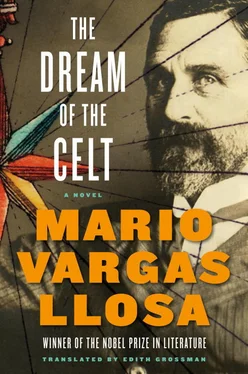From then on Roger rarely saw his father and never again heard him tell those stories about India and Afghanistan. Captain Roger Casement died of tuberculosis in 1876, three years after his wife. Roger had just turned twelve. In Ballymena Diocesan School, where he spent three years, he was a distracted student who received mediocre grades except in Latin, French, and ancient history, classes in which he was outstanding. He wrote poetry, always seemed lost in thought, and devoured books of travels through Africa and the Far East. He engaged in sports, swimming in particular. On weekends he went to the Young family’s Galgorm Castle, invited by a classmate. But Roger neglected him and spent more time with Rose Maud Young, beautiful, well educated, and a writer, who traveled the fishing and farm villages of Antrim collecting poems, legends, and songs in Gaelic. From her mouth he heard for the first time the epic battles of Irish mythology. The castle of black stone, with its fortified towers, coats of arms, chimneys, and cathedral-like facade, had been built in the seventeenth century by Alexander Colville, a theologian with an ill-favored face—according to his portrait in the foyer—who, they said in Ballymena, had made a pact with the devil, and whose ghost walked the castle. On certain moonlit nights, a trembling Roger dared to search for him in passageways and empty rooms but never found him.
Only many years later would he learn to feel comfortable in Magherintemple House, the Casement family’s ancestral home, which had once been called Churchfield and had been a rectory of the Anglican parish of Culfeightrin. Because for the six years he lived there, between the ages of nine and fifteen, with Great-Uncle John and Great-Aunt Charlotte and the rest of his paternal relatives, he always felt something of a foreigner in the imposing mansion of gray stone with its three stories, high ceilings, ivy-covered walls, false Gothic roofs, and hangings that seemed to hide ghosts. The vast rooms, long hallways, and staircases with worn wooden banisters and creaking steps increased his solitude. On the other hand, he enjoyed the outdoors, the robust elms, sycamores, and beech trees that resisted the hurricane-force wind, the gentle hills with cows and sheep where one could see the town of Ballycastle, the ocean, the breakers crashing into Rathlin Island, and on clear days, the blurred silhouette of Scotland. He frequently went to the nearby villages of Cushendun and Cushendall, which seemed to be the setting for ancient Irish legends, and the nine glens of Northern Ireland, those narrow valleys surrounded by hills and rocky slopes at whose peaks eagles traced circles, a sight that made him feel valiant and exalted. His favorite diversions were excursions through that harsh land, its peasants who seemed as old as the landscape, some speaking the old Irish among themselves, about which Great-Uncle John and his friends sometimes made cruel jokes. Charles and Tom did not share his enthusiasm for life in the open air and did not enjoy cross-country hikes or climbing the rugged hills of Antrim, but Nina did, and for that reason, in spite of her being eight years older, she was his favorite sibling, the one he got along with best. He made several excursions with her to the Bay of Murlough, bristling with black rocks, and its stony little beach at the bottom of Glenshesk, which would stay in his memory as long as he lived and to which he would always refer, in letters to his family, as “that corner of Paradise.”
But even more than walks through the countryside, Roger liked summer vacations. He spent them in Liverpool with his aunt Grace, his mother’s sister, in whose house he felt loved and welcomed, by Aunt Grace, of course, but also by her husband, Uncle Edward Bannister, who had traveled much of the world and made business trips to Africa. He worked for the shipping company the Elder Dempster Line, which transported cargo and passengers between Great Britain and West Africa. Aunt Grace and Uncle Edward’s children, his cousins, were better playmates to Roger than his own siblings, especially Gertrude Bannister, or Gee, with whom, from the time he was very young, he had an intimacy never dimmed by any quarrel. They were so close that Nina once joked, “You’ll end up marrying each other.” Gee laughed but Roger blushed to the roots of his hair. He didn’t dare look up and stammered, “No, no, why are you talking nonsense?”
When he was in Liverpool with his cousins, Roger sometimes conquered his timidity and asked Uncle Edward about Africa, a continent whose mere mention filled his head with jungles, wild animals, adventures, and intrepid men. Thanks to Uncle Edward Bannister he heard for the first time of Dr. David Livingstone, the Scots physician and evangelist who had explored the African continent for years, traveling rivers such as the Zambezi and the Shire, naming mountains and unknown places, and bringing Christianity to tribes of savages. He had been the first European to cross Africa coast to coast, the first to traverse the Kalahari Desert, and he had become the most popular hero in the British Empire. Roger dreamed about him, read the pamphlets that described his exploits, and longed to be part of his expeditions, facing dangers at his side, helping to bring the Christian faith to pagans who had not left the Stone Age. When Dr. Livingstone, looking for the sources of the Nile, disappeared, swallowed up by the African jungles, Roger was two years old. When, in 1872, another legendary adventurer and explorer, Henry Morton Stanley, a reporter of Welsh origin employed by a New York newspaper, emerged from the jungle and announced to the world that he had found Dr. Livingstone alive, Roger was almost eight. The boy followed the heroic story with astonishment and envy. And when, a year later, he learned that Dr. Livingstone, who never wanted to leave African soil or return to Britain, had died, Roger felt he had lost a beloved friend. When he grew up, he too would be an explorer like those titans, Livingstone and Stanley, who were expanding the frontiers of the West and living such extraordinary lives.
When he turned fifteen, Great-Uncle John Casement advised Roger to abandon his studies and look for work, since he and his brothers and sister had no income to live on. He happily accepted the advice. By mutual agreement they decided Roger would go to Liverpool, where there were more possibilities for work than in Northern Ireland. Shortly after he arrived at the Bannisters’, Uncle Edward obtained a position for him in the same company where he had worked for so many years. He began as an apprentice in the shipping firm soon after his fifteenth birthday. He looked older. He was very tall and slim, with deep gray eyes, curly black hair, very light skin, even teeth, and he was temperate, discreet, neat, amiable, and obliging. He spoke English with an Irish accent, the cause of jokes among his cousins.
He was a serious boy, tenacious and laconic, not very well prepared intellectually but hardworking. He took his duties in the company very seriously, determined to learn. He was placed in the Department of Administration and Accounting. At first, his tasks were those of a messenger. He fetched and carried documents from one office to another and went to the port to take care of formalities regarding ships, customs, and warehouses. His superiors treated him with consideration. In the four years he worked at the Elder Dempster Line, he did not become intimate with anyone, due to his retiring manner and austere habits: opposed to carousing, he practically did not drink and was never seen frequenting the bars and brothels in the port. He did become an inveterate smoker. His passion for Africa and his commitment to doing well in the company led him to read carefully, and fill with notes, the pamphlets and publications dealing with maritime trade between the British Empire and West Africa that made the rounds of the offices. Then he would repeat with conviction the ideas that permeated those texts. Bringing European products to Africa and importing the raw materials that African soil produced was, more than a commercial operation, an enterprise in favor of the progress of peoples caught in prehistory, sunk in cannibalism and the slave trade. Commerce brought religion, morality, law, the values of a modern, educated, free, and democratic Europe, progress that would eventually transform tribal unfortunates into men and women of our time. In this enterprise, the British Empire was in the vanguard of Europe, and one had to feel proud of being part of it and the work accomplished at the Elder Dempster Line. His office colleagues exchanged mocking looks and wondered whether young Roger Casement was a fool or a smart aleck, whether he believed that nonsense or declaimed it in order to look good to his superiors.
Читать дальше












